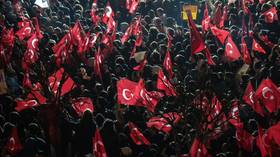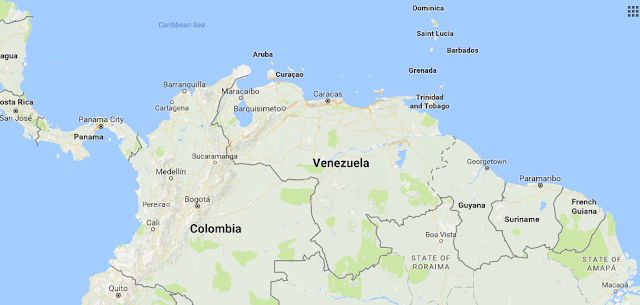Erdogan appears to be fighting for his political life here, but more so, for his ambitious dream of rebuilding the Ottoman Empire.
Riots break out at Ankara university campus after Erdogan rival detained
Thousands protest arrest of Istanbul mayor

Thousands of people took to the streets of Istanbul on Wednesday to decry the arrest of the city's mayor, Ekrem Imamoglu, who is viewed as the main political rival to Turkish President Recep Tayyip Erdogan in elections scheduled for 2028.
Imamoglu, one of the key figures in the opposition Republican People’s Party (CHP), was among a hundred people detained earlier in the day on charges of corruption and alleged links to the Kurdistan Workers’ Party (PKK), which is considered a terrorist organization by Ankara. The mayor was taken into custody just days before his official nomination as CHP’s presidential candidate.
Following Imamoglu’s arrest, the Turkish authorities imposed a four-day ban on demonstrations, closed down several roads in Istanbul and put restrictions on social media platforms.
However, it did not prevent protesters from taking to the streets, as huge crowds gathered outside Istanbul's police headquarters, City Hall, the main office of the Republican People's Party, and other locations.
The demonstrators carried Turkish national flags and portraits of Ekrem, chanting anti-government slogans and demanding the mayor’s release.
“We came here to support the mayor. They arrested him unjustly,” one of the people in the crowd told Reuters. Another demonstrator complained to AFP that “we are living in a dictatorship.”
There have been reports of minor clashes between the protesters and riot police, with Reuters publishing a video showing the officers using pepper spray to disperse a crowd outside Istanbul University.
Imamoglu wrote in a post on X before his arrest that “the will of the people cannot be silenced through intimidation or unlawful acts,” vowing to continue to “fight for fundamental rights and freedoms.”
During a press conference, CHP’s leader Ozgur Ozel called the mayor’s detention “a coup” and accused Erdogan of being afraid to lose to Imamoglu in the election.
Turkish Justice Minister Yilmaz Tunc said later that Ozel’s comments were “extremely dangerous and incorrect.”
The country’s justice system is “impartial and independent” and because of this “linking investigations and cases initiated by the judiciary to our president is, at best, presumptuous and inappropriate,” the minister insisted.
Turkey arrests 37 for 'provocative' social media posts over Istanbul mayor's arrest
March 20 (UPI) -- Turkey on Thursday arrested 37 people for social media posts deemed "provocative" following the Wednesday arrest of political opposition leader and Istanbul Mayor Ekrem Imamoglu.
Turkey's Interior Ministry said in a statement that the so-called "provocative posts" were allegedly made "within the scope of the crime of "Incitement to Commit a Crime."
"A total of 261 suspicious account managers, 62 of whom were abroad, were identified as having made these posts," the ministry said.
"Following the coordinated work of our Cyber Crime Presidency and Security Department, 37 suspects were caught and efforts to catch the other suspects are ongoing."
Related
The ministry said a total of 18,647,269 posts were made on X. Of those the government determined that 66% were from named accounts and 34% were bot accounts.
The ministry did not provide any examples of the allegedly criminal posts.
"We as a nation must stand against this evil. This is my call to my nation...The day has come to speak out," a post on Imamoglu's X account Thursday said.
The post called upon the Turkish judiciary to stand up against the use of the legal system to carry out a crackdown on political opposition.
"You must stand up and take precautions against this handful of colleagues who are ruining the Turkish judiciary, disgracing us to the whole world and destroying our reputation," the post said. "I trust the Great Turkish Judiciary. You cannot and must not remain silent."
People opposed to Mayor Imamoglu's Wednesday arrest as well as the arrests of 106 other people in the crackdown on political opposition say his arrest is a "coup."
Opposition demonstrations are planned even though the government has banned protests for four days as part of the political crackdown.
Imamoglu's opposition political party still controls Istanbul's government even though he is in custody.
In Istanbul, loudspeakers at metro stations played some of Imamoglu's speeches. One excerpt heard over the speakers said, "I promise you with my honor that I am going to win this fight."
University students have protested, but so far not in large numbers compared to Istanbul's 16 million population.
Among the student protesters' chants are a common one heard in Turkey, "We are not scared, we won't be silenced, we will not obey."
According to critics of Erdogan's government, the controversial arrests in this political crackdown are the most clear-cut democracy violations the government has ever carried out.
The controversy has also impacted Turkey's already-troubled economy with markets dropping Wednesday on news of Imamoglu's arrest.
Istanbul economist and consultant Arda Tunca told CNBC, "Turkey has already been in decline, but this is a political free fall. Today is history and a new dimension in Turkey's breakaway from democracy."

























